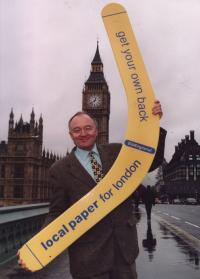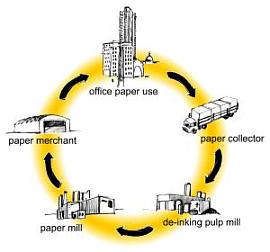and reduce waste by joining the Local Paper for London scheme.
You may have thought about setting up your own office paper recycling system but perhaps time and support were in short supply? Or would like to switch to recycled paper but don’t know where to start?
Help is at hand, BioRegional is providing a sustainable office paper cycle for London and the South East, with free advice and support on how businesses can recycle their white office paper waste at their local paper mill, then buy back the 100% recycled office paper that the mill produces, thereby ‘getting their own back’. The scheme called Local Paper for London, gives measurable results. Offices are saving money, reducing landfill and waste incineration rates, and saving trees too. Appropriately launched by the then Mayor Ken Livingstone in 1999, the initiative is a positive solution to the incineration or dumping of waste office paper in the South East. Devised by local environmental organisation BioRegional, Local Paper for London aims to counter the area’s currently unsustainable office paper use and make it easy for offices to deal with their paper waste effectively.
There are many benefits to joining the scheme. Cost is always a consideration, many of the participating organisations have found that EVOLVE, the 100% local, recycled, printer/photocopier-friendly paper, is cost competitive. Offices can also save on trade waste charges by recycling instead of dumping waste paper, cutting their annual paper bills by as much as 20%.
Direct Line Insurance plc joined the initiative late in 1999. Richard Houghton, the company’s Financial Director gave his opinion on the scheme:
“Environmental performance and cost control are very important to us at Direct Line and the nice thing about the scheme is that it meets both our needs. We get savings of around 20% on our paper bill because of free pick ups of our waste paper, and cheaper paper coming into the office as well, and the nice thing is it also meets this closed loop environmentally so we believe we’re saving all round.”
Local people also benefit from the project, with the creation of new jobs in paper recycling as the scheme has expanded, and as if this isn’t enough to get motivated the project means good news for the environment too. All of the wood pulp used to make virgin fibre office paper in the UK is imported. Recycling locally can reduce transport to a minimum, therefore saving energy and contributing less to global warming than importing wood pulp to make paper.
Obviously no two offices are the same; BioRegional will help set up the recycling system that best suits you by identifying and liasing with the appropriate collector, giving advice on recycling bins and providing materials to help you save paper around the office. The team will also put you in touch with paper suppliers and provide price comparisons to help you switch to local, recycled, top quality, photocopier/printer-friendly paper to instantly improve your offices environmental impact. By joining local paper for london your office will be in good company; other participants include The Greater London Authority, IKEA, The Royal Albert Hall and hundreds of others big and small.
The government also recognises the need for better office paper practice: its Waste Recycling Action Programme (WRAP) set a recent target of doubling UK office and printing paper recycling by 2003/4. London’s Mayor has also pledged to increase office paper recycling. The scheme has the potential to cut office waste significantly. Collectively, in 2001, the 361 participating organisations collected 1,708 tonnes of office paper for recycling, this equates to enough paper to fill 44 double decker uses, and saved 29,036 trees from being felled. This is a great achievement, but there is potential to save even more paper locally if more organisations join the scheme.
By looking at the UK’s current paper use we can see just why the scheme is so necessary. We use 4.6 million tonnes of office and printing paper annually in the UK, (44% of total paper consumption), yet we only recycle 15%. A meagre 4.5 % of office and printing paper has any recycled content, this means that the majority of paper collected is being downgraded into e.g. packaging, toilet roll and newsprint, and so in effect this resource is being devalued. In 2000 BioRegional carried out a London specific survey on office paper use and found that 41% of London offices still bin paper, and 77% of London firms never buy recycled paper. Large businesses with a turnover of between £2 million and £5 million are the worst offenders with only 25% of them recycling. The World Wide Fund for Nature’s figures show that 23 hectares of forest are lost across the globe every minute. Wouldn’t it be better to use our finite resources where needed rather than for paper that can easily be recycled?
Basically we need to reduce the eco-footprint of our consumption. Eco-footprints analyse the land area needed to create and dispose of products. If everyone in the world consumed as much as the average UK inhabitant currently does we would need 3 worlds to support us. An Eco-footprint analysis carried out by Best Foot Forward, with data drawn from a Life Cycle Analysis of the of the local paper for london loop being carried out by Surrey University, shows that local recycled paper is by far the best environmental option. Local recycled paper has only half the footprint of imported recycled paper and a mere 15% of the footprint of imported virgin-pulp paper.
A recent extension of the scheme has seen the local paper loop promising to expand into Scotland. Scotland was selected primarily because it has 2 under-utilised mills – potential sites for recycled paper manufacture. Furthermore BioRegional surveys had shown that the percentage of offices recycling in Scotland was very low but that there is enthusiasm for the scheme to be implemented. The project is currently being set up whilst carrying out further research and trials. BiffaAward, a multi-million pound environment fund which utilises landfill tax credits donated by Biffa Waste Services is supporting the project alongside the Shell Better Britain Campaign. Local paper for London is funded by EB Nationwide Ltd with donations from Shanks under the Landfill Tax Credit Scheme.
Let BioRegional make it easy for you to reduce your eco-footprint and close the loop on your office paper use. For free advice and information call Katrina Stewart, promoter for local paper for london on 020 8404 4884,
or email localpaper@bioregional.com
or visit the local paper Web pages at www.bioregional.com
Or if you are based in Scotland please call Karen or Matt on
0141 572 1256/7, or email
karenstevens@bioregional.com or
mattdavis@bioregional.com


